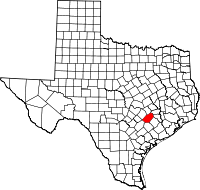Muldoon, Texas
| Muldoon, Texas | |
|---|---|
 Muldoon  Muldoon | |
| Coordinates: 29°48′57″N 97°04′16″W / 29.81583°N 97.07111°W | |
| Country | United States |
| State | Texas |
| County | Fayette |
| Area | |
| • Total | 0.7 sq mi (1.7 km2) |
| • Water | 0.04 sq mi (0.1 km2) |
| Elevation | 266 ft (81 m) |
| Population (2010) | |
| • Total | 114 |
| Time zone | Central (CST) (UTC-6) |
| • Summer (DST) | CDT (UTC-5) |
| ZIP code | 78949 |
| Area code(s) | 361 |
| FIPS code | 48-40276[1] |
| GNIS feature ID | 1360798[2] |
Muldoon is a town in southwestern Fayette County, Texas, United States, located 10 miles north of Flatonia and 16 miles southwest of La Grange. Its population, according to the 2010 census, is 114 and is growing very slowly. It is on the junction of FM 154 and FM 2237.
History
The town of Muldoon was named after Father Michael Muldoon, a clergyman who briefly served Stephen F. Austin's first colonists. He was the only non-Hispanic member of the Monterrey, Mexico Diocese and was probably assigned his duties because he spoke English. He was born in County Cavan in Ireland and later ordained in Spain.
In 1834, Muldoon travelled to Mexico to visit Stephen F. Austin during Austin's confinement there. Later, he assisted William Wharton in his escape from a Matamoros prison in 1837, after which the town of Wharton, Texas was founded. Muldoon was openly pro-Texan, which led to his own brief imprisonment by the Mexican government. However, he was eventually released, and even travelled back to Texas following the revolution, making an appearance in 1842 during which he was given a letter of appreciation from Texas President Anson Jones. Afterward, Father Muldoon disappeared from history and his final resting place is unknown.
The Union Pacific Railroad tracks, laid in the early 1900s and travelling parallel to FM 154, once carried a high volume of passenger traffic to and from Muldoon on a regular basis. During this period, the railroad formed a large portion of Muldoon's economy; however, ridership eventually dwindled and Muldoon's prominence as a rail depot faded. Additionally, the advent of diesel-powered locomotives meant that trains no longer needed to stop as frequently to refill their water tanks, which further reduced the need for trains to stop in Muldoon. The old train station was abandoned in the 1950s and the Dinky (a small passenger train) which ran a route from Flatonia, Texas to Muldoon was moved away. In the 1960s, Hurricane Carla severely damaged the old water tower which had served the steam locomotives, and this structure was subsequently removed.
Muldoon once had a thriving business community, including several stores, at least one saloon, a blacksmith shop, a small hotel, and a rock quarry which produced the stone used in the construction of the Galveston jetties and several other structures. None of these businesses are still in operation. The Kerr Store, which was built in 1890 and abandoned in the mid 1900s, still stands today along FM 154, along with another former store building, the former blacksmith shop, and several other historic buildings.
In more recent history, a few scenes from the movie Michael were filmed in Muldoon. Muldoon was featured in the first scenes of the movie, posing as the fictitious town of Stubbs, Iowa. Other parts of the movie were filmed in a dancehall in Winchester, Texas, and the indoor Fayette County courthouse in La Grange.
Today, although Muldoon is larger than the neighboring towns of Cistern, Texas and West Point, Texas, there is no commercial activity in the community. In fact, apart from the post office, the only organizations that are still operating in Muldoon are three churches and the Muldoon Volunteer Fire Department. However, these organizations are very active, with several events each year that bring the community together, including memorial services at the Pitman Cemetery (1st Sunday in May), the July 4th parade, the Muldoon Baptist Church Vacation Bible School (2nd week of July), and the annual Fire Department fundraisers.
References
- ↑ "American FactFinder". United States Census Bureau. Retrieved 2008-01-31.
- ↑ "US Board on Geographic Names". United States Geological Survey. 2007-10-25. Retrieved 2008-01-31.
External links
- MULDOON, TX Handbook of Texas Online.
- MULDOON, TX Texasescapes.
Coordinates: 29°48′57″N 97°04′16″W / 29.81583°N 97.07111°W
